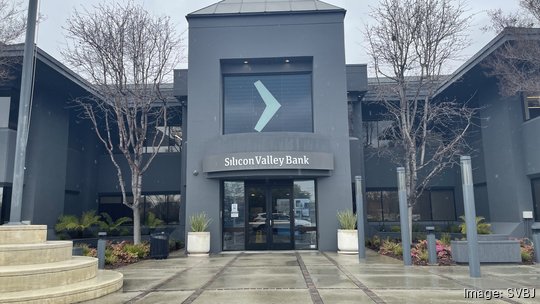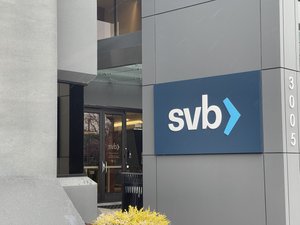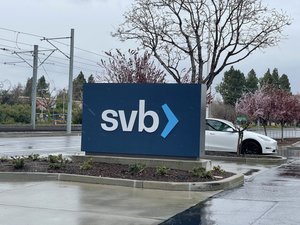
It's Tuesday morning, and venture capitalist Chris Olsen says he's about 72 hours behind on sleep.
Olsen, the co-founder of Columbus, Ohio-based VC firm Drive Capital, spent the tail end of last week and the weekend determining how many of his startup investments had exposure to now-failed Silicon Valley Bank, and how he was going to help them make payroll and other near-term expenses in light of the second-largest bank failure in U.S. history.
Out of Drive's more than 100 portfolio companies, around a third of those startups banked with Silicon Valley Bank. Of those, 15 had some or all of their assets trapped at the bank by the time federal regulators stepped in and closed the bank on Friday. Complicating matters, Drive itself was a customer of SVB and had assets it could not retrieve.
Despite its name, Silicon Valley Bank transcended its geographic namesake. SVB, founded 40 years ago, serviced a huge share of VC-backed U.S. tech startups. Its reach extended even beyond the U.S., working with startups from Africa to Asia.
"Silicon Valley Bank is a misnomer for what is a global financial partner to companies around the world," Olsen said. "They had a massive presence in Chicago. A massive presence in New York. A massive presence in every corner of the relevant startup ecosystems around the world."
SVB was "built from a startup community for startup companies," Olsen said. "The loss of Silicon Valley Bank will be a hindrance to the startup ecosystem of the world."

Across the country, startup founders and investors were scrambling to make sense of an unprecedented situation: a lightning-fast bank run that dismantled a top-20 bank in the U.S., and the prospect of companies unable to make payroll. Or worse, an "extinction-level event" that could have upended the entire startup sector, as Y Combinator CEO Garry Tan put it.
"I'm not sure that non-techies realize how close we came to a Depression-era, systemic bank run situation," said Christopher Deutsch, the founder of Chicago VC firm Lofty Ventures.
Deutsch said about 15% of his portfolio, mostly early-stage Chicago startups, banked with SVB. He spent the majority of the weekend in "war room" mode, texting, emailing and holding Zoom calls with founders. He said he spent a total of 12 hours listing and participating in Twitter Spaces with founders desperate for information and advice on how to navigate the SVB collapse. In one instance, he was working to move funds from a founder's Silicon Valley Bank account to his own Lofty Bank of America account.
Frantic messages between startup founders and investors pinged in cities across the U.S. In Austin, where SXSW was taking place, founders and VCs were literally walking off stage in the middle of presentations as news broke.
Vancouver-based Slumberkins, a startup that makes a line of popular children's books and characters, had the majority of its capital in an SVB account, creating extreme uncertainty for the company that raised about $17 million from investors over the last seven years.
"When the money had not come through and we looked at ourselves and said, ‘OK this could be the end of Slumberkins.’ We don’t have money in the bank to make payroll," co-CEO Callie Christensen said.

Oriana Papin-Zoghbi, the co-founder of VC-backed Boston startup AOA Dx, spent the weekend frantically canceling subscriptions, co-working space and other expenses that were automatically linked to the firm's SVB account in order to keep every cent possible to cover payroll.
“I am permanently scarred from this,” Papin-Zoghbi said. “My world has been disrupted … Friday was, I think, the worst day I’ve ever lived on this planet.”
In Wisconsin, there were at least two cases where a company was working to close a merger or acquisition with another firm that banked with SVB and saw that deal stalled due to the bank's collapse, according to Venture Best, a Milwaukee law firm that focuses on startups.
The chaos was felt by startup founders from Louisville, Baltimore, Albuquerque and of course the Bay Area, where in one instance founder David Johnson received funding for his biotech startup GigaMune on March 6 and was unable to access it just four days later. Also frozen was $600,000 of Johnson's personal money that he had contributed to the seed round.
"The timing was about as awkward as you can get," he said.
Even as companies had full access to their accounts the next day, there are concerns around what happens next in startup hubs across the country. Greg Seltzer, the co-leader of Philadelphia-based Ballard Spahr’s emerging growth and venture capital group, said his message to startups has been to "prepare for the worst" amid the SVB fallout.
"My clients and the customers of the bank should be okay," Seltzer said. "What should the concern be? Is this bank failure going to have a wider impact, a broader impact on the startup and venture capital community? The fundamentals are really split on that, and there's no right answer."
This year was already off to a rocky start for many tech startups following a 2022 that saw venture funding fall from 2021's record highs. Layoffs have hit tech firms both large and small. Exits, both public offerings and acquisitions, have plummeted. Is SVB's failure an indicator of even more startup sector struggles to come?
In the near term, it certainly could have an impact on startups' access to venture debt, according to Saxon Baum, partner at Tampa-based Florida Funders.
"[Silicon Valley Bank] was the core player in that line of credit or loaning," Baum said. "So pulling that out, there are fewer players, and it’ll be harder to get venture debt."

Silicon Valley Bank was a core partner to much of the tech community for four decades, and as Chicago VC Christopher Deutsch put it, banking with SVB was a "badge" for founders in emerging startup hubs.
"There's definitely a level of prestige around that," he said. "The deep and sad irony is it ended up being almost the poison pill for companies."
Additional reporting by Austin Inno's Brent Wistrom, BostInno's Hannah Green, Portland Inno's Malia Spencer, Wisconsin Inno's Teddy Nykiel, Bay Area Inno's Sara Bloomberg, Tampa Bay Inno's Lauren Coffey, PHL Inno's Ryan Mulligan



